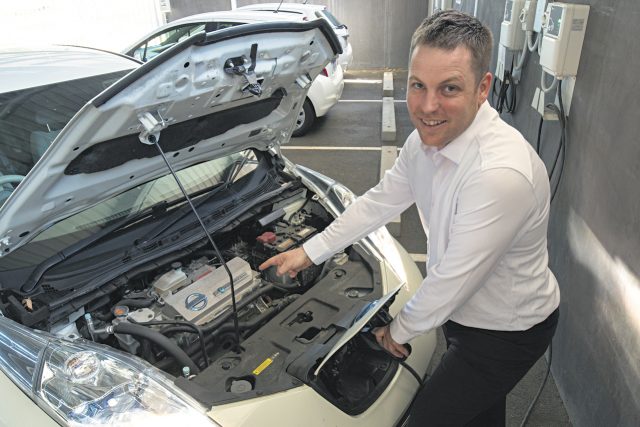
Electric car enthusiast and City of Canning councillor Jesse Jacobs is again pushing for the city to become an electric car friendly zone.
At its February 20 meeting, the Canning council will vote on whether to continue investigating developing a network of car charging sites across the region, for which demand is likely to grow in coming years.
A map of electric vehicle charging sites across Perth provided by the city showed a gap in the southeast, and council will vote next week whether to invite the Australian Electric Vehicle Association to brief to them on developing a charging network.
A city report on the matter earmarked several possible charging sites including the Cannington and Riverton Leisureplexes, Lo-Quay Café in Wilson and on Cecil Avenue near Carousel Shopping Centre.
The report said if installed the sites were likely to be powerful enough to add about 40 kilometres of driving range to a car per hour of charge.
The city has contacted the adjacent Cities of South Perth, Melville, Armadale, Cockburn, Swan and the Town of Victoria Park to gauge their interest in a local government partnership, with mixed responses.
Electric vehicle technology has advanced in leaps and bounds in recent years.
While the technology was often criticised when it was first released because of long charge times and limited driving range, manufacturers say affordable new electric car models like the Nissan Leaf can travel a distance of 170 kilometres on a charge, while the premium level Tesla Model S can reach up to 540 kilometres between charges.

Canning councillor Jesse Jacobs raised the motion to investigate installing charging sites across the region late last year and said he thought it was a step in the right direction.
Mr Jacobs drives an electric Nissan Leaf which he purchased in 2011, and said his savings on fuel and maintenance had exceeded $10,000 in that time.
“It was a leap of faith, but I saw what the future would be,” he said.
Mr Jacobs said electric vehicles had become more affordable in recent years, and he believed it was inevitable they would eventually become more popular than traditional combustion engine cars.
“Not everyone can afford a new Tesla, but if you look into it there are other companies offering cheaper cars that can reach 400 kilometres per charge,” he said.













